Solidarity and steadfastness. These qualities were evident among Ukrainians long before missiles began pulverizing their cities early Thursday morning. They were on display again on Friday and Saturday in Taipei’s Xinyi District (信義), where hundreds of people gathered outside the building housing the Russian representative office.
Ukrainians were prominent among them. Some arrived in tears — on Friday, one young woman shook convulsively throughout, her bloodshot eyes betraying fatigue and distress. Many of those present had been up all night talking to friends and family. With each new arrival, there were hugs and timid smiles, yet the trepidation hung thick.
“My family are fine right now,” says Tanya Polyak, who like several of the young Ukrainian women present, works as a model. “Just a few hours ago they heard a loud explosion, but they didn’t feel anything.”
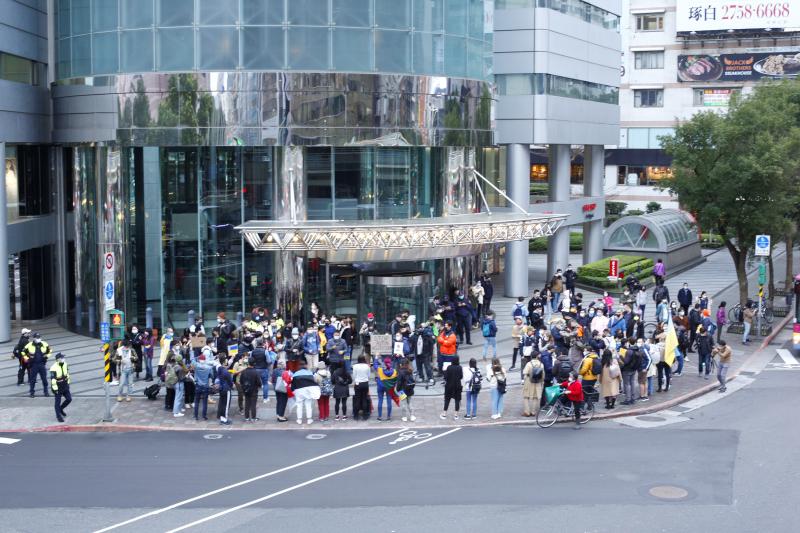
Photo courtesy of Yunjie Liao
Despite the looming threat, many Ukrainians expressed shock at the pace of the escalation.
“We thought [Russian President Vladimir] Putin was only showing muscle,” says Polyak. “My family is in Lviv, close to Poland, and there is already bombing 20 kilometers from the city. If it’s there that fast, we know it’s really bad.”
Natasha Bessavova, a 23-year-old model, echoed Polya’s surprise.
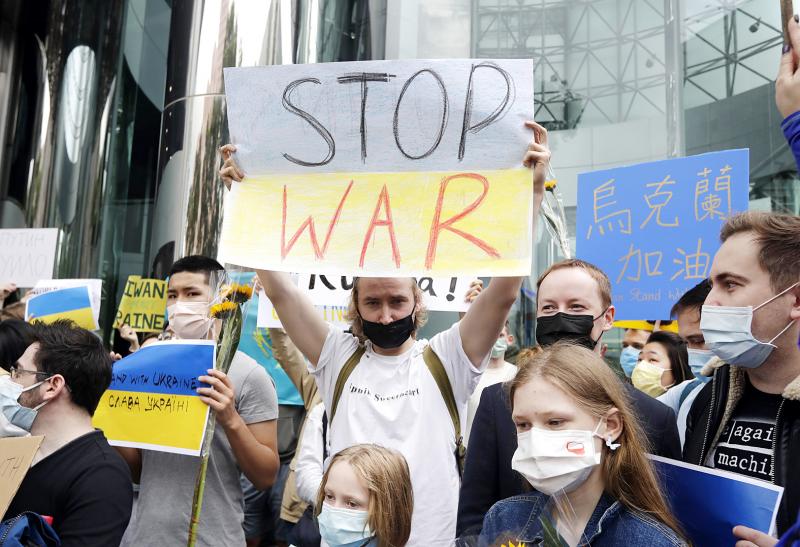
Photo: AP
“I’m speechless,” says Bessavova, who arrived in Taiwan at the age of sixteen. “When I saw the news, it felt like a dream. I’m most concerned for my brother as he’s in the military, and it’s hard to keep in touch,” she says.
Having seen action during Russian annexation of Crimea in 2014, her sibling had described the hellish scenes he encountered.
“He saw the dead bodies of his friends,” says Bessavova. “Many young men died there.”
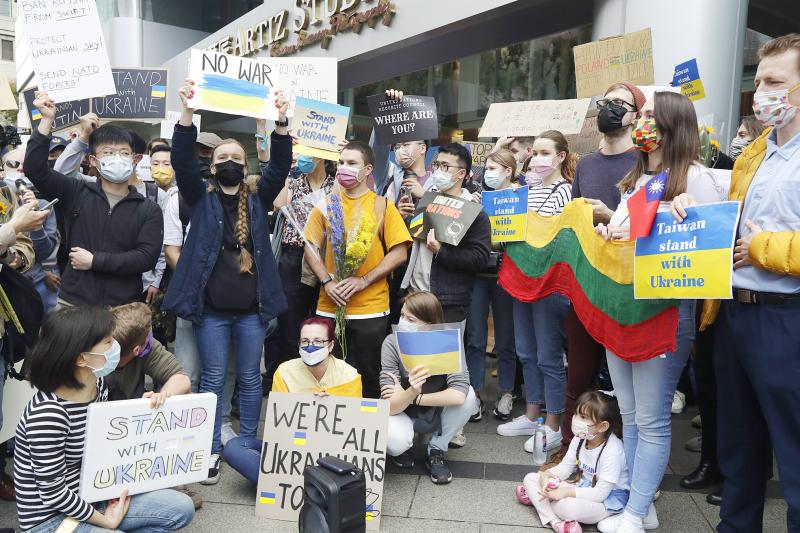
Photo: AP
Further emphasizing the apprehension that ex-pat Ukrainians are feeling, Taichung-based Ukrainian Yana Bass spoke of a chilling interaction with her mother. Her family live next to a military base in the central city of Kryvyi Rih, which put them in immediate danger.
“My mum had just woken up from the bombing sound as I called,” says Bass, who was unable to attend the demonstrations in Taipei. “There were four very loud explosions, which I heard myself. Windows were broken and a balcony collapsed. My mom was terrified and didn’t know whether to stay or go — both options were dangerous.”
Eventually, her mother hastily packed a bag with clothes and any documents that might be required and fled to a relative’s house with Bass’s 90-year-old grandmother in tow.
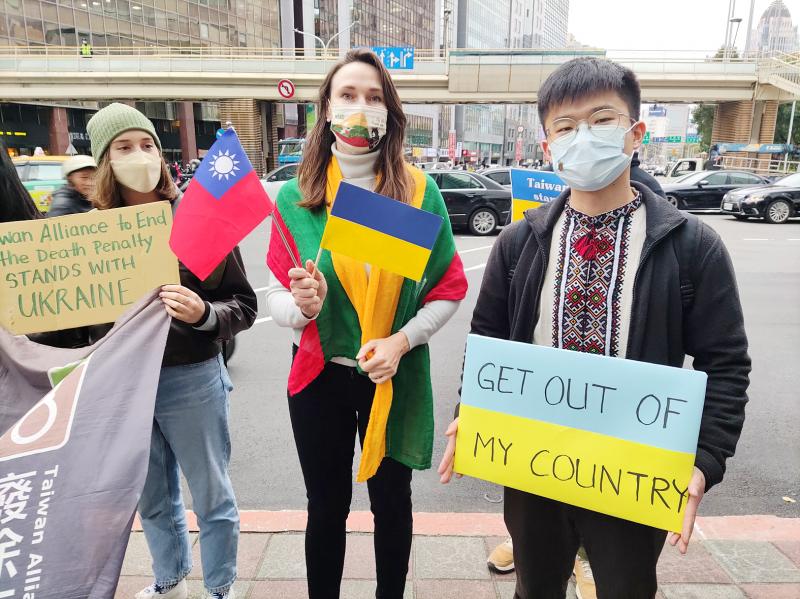
Photo: James Baron
ESCAPE ROUTES
It’s a familiar story. Artem Subotka, a Belarusian who has two sisters in Ukraine — one in the capital Kyiv, another in the southern city of Chernivtsi — was also in shock.
“People are preparing for the worst, hoarding food and gas,” he says. “Everyone’s keeping their passports with them at all times. My brother-in-law is getting the car ready.”
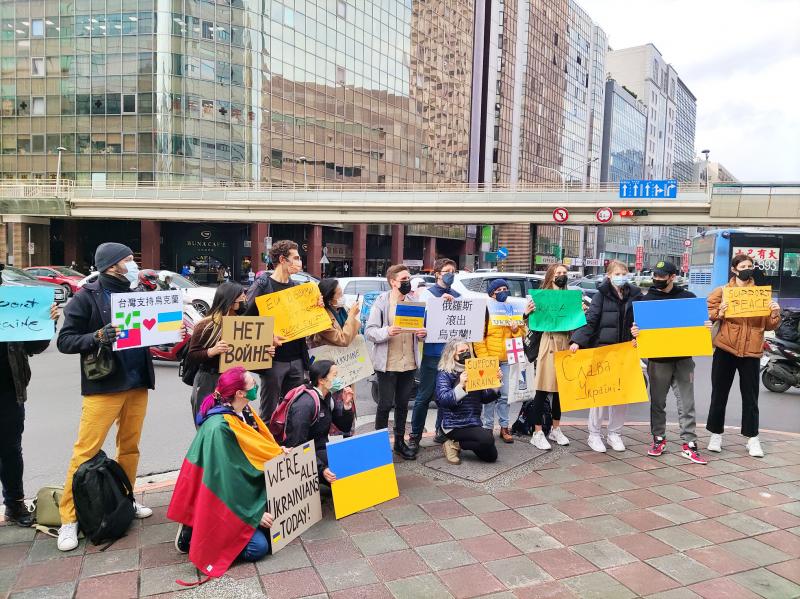
Photo: James Baron
Subotka is unsure which route his family will take out of the country if the time comes but is certain of one thing.
“Definitely not Belarus,” he says of his home country, whose dictator Alexander Lukashenko has reportedly already sent troops in Ukraine to assist the Russian invasion. “They will probably head south to Romania,” Subotka says.
Citizens of other former Eastern and Soviet bloc countries were prominent at the Taipei demonstrations. All spoke of the bond they felt with Ukraine.
“We’re neighbors, former Soviet countries, so we feel for them,” says Lali Shavelashvili, a 20-year resident of Taiwan who teaches synchronized swimming. Holding up her smartphone, she flicks through photos of a rally in the Georgian capital of Tbilisi which drew thousands in support of Ukraine. Given Russia’s invasion of the country in 2008, are there fears that the Georgia could be in Putin’s sights again?
“Not could be,” says Shavelashvili, who demonstrated here in 2008. “We’re definitely next, if they succeed with what they’re doing in Ukraine.”
FRACTURED RELATIONSHIPS
Fears that this is just the first step in Putin’s grand design are common.
“In Kazakhstan people feel this fear that imperialistic ideas are growing in Russia,” Temir Sakavov, a PhD student at National Tsing Hua University (國立清華大學) in Hsinchu. “But I wouldn’t say it’s growing among the people. It’s in leadership circles.”
Several Russians who participated in Friday’s event are keen to emphasize this point.
“Being Russian in this situation is hard because I feel how everyone just hates us,” says a woman named Lera, who like some other Russian participants declined to give her surname. “It’s like a national pain. I just want to scream ‘Why? It’s not about us!’ But then I try to understand people there are dying.”
Another Russian citizen named Alex shares this frustration.
“Unfortunately, I’ve already seen some Russophobia online — not directed to Putin, but Russians in general,” he says. “I can totally understand because Ukrainians are in such a situation right now.”
More than anything, he laments the damage done to personal relationships.
“It’s very sad to see how the Russian authorities have tried to diminish and destroy those connections over the last few years.”
FLY THE RUSSIAN FLAG?
Prior to Friday’s gathering, there had been online discussions among Russians about flying the Russian flag. This was vehemently opposed by some Ukrainian participants.
“Our cities are being sieged. If Russians in Taipei want to show solidarity, they should stand with us behind our flag,” said Oleksander Shyn, an activist with the Liberal Democratic League of Ukraine, a youth NGO. “I know some of those people truly want to demonstrate their demand for peace. But flying Russian flags is a no go.”
The issue became a sticking point, and while no official decision was made, “everyone was sensible enough not bring them,” says Shyn.
This disagreement aside, the presence of Russians at the two events was supported by all the Ukrainian participants.
“Support from them is the most powerful thing right now,” says Tanya Polyak. “If all of them get together, they can kill this government.”
Alex Khomenko a Ukrainian-American entrepreneur from Kharkiv in northwest Ukraine, who led a solo protest on Thursday, hours after the invasion was announced, says the blame lies squarely with Putin.
“He simply hates the idea of an independent Ukraine that is defying his desire to rebuild the Soviet Union,” he says. “But Ukraine will not go down. We will kick their asses.”

Jacques Poissant’s suffering stopped the day he asked his daughter if it would be “cowardly to ask to be helped to die.” The retired Canadian insurance adviser was 93, and “was wasting away” after a long battle with prostate cancer. “He no longer had any zest for life,” Josee Poissant said. Last year her mother made the same choice at 96 when she realized she would not be getting out of hospital. She died surrounded by her children and their partners listening to the music she loved. “She was at peace. She sang until she went to sleep.” Josee Poissant remembers it as a beautiful

March 2 to March 8 Gunfire rang out along the shore of the frontline island of Lieyu (烈嶼) on a foggy afternoon on March 7, 1987. By the time it was over, about 20 unarmed Vietnamese refugees — men, women, elderly and children — were dead. They were hastily buried, followed by decades of silence. Months later, opposition politicians and journalists tried to uncover what had happened, but conflicting accounts only deepened the confusion. One version suggested that government troops had mistakenly killed their own operatives attempting to return home from Vietnam. The military maintained that the

Before the last section of the round-the-island railway was electrified, one old blue train still chugged back and forth between Pingtung County’s Fangliao (枋寮) and Taitung (台東) stations once a day. It was so slow, was so hot (it had no air conditioning) and covered such a short distance, that the low fare still failed to attract many riders. This relic of the past was finally retired when the South Link Line was fully electrified on Dec. 23, 2020. A wave of nostalgia surrounded the termination of the Ordinary Train service, as these train carriages had been in use for decades

Lori Sepich smoked for years and sometimes skipped taking her blood pressure medicine. But she never thought she’d have a heart attack. The possibility “just wasn’t registering with me,” said the 64-year-old from Memphis, Tennessee, who suffered two of them 13 years apart. She’s far from alone. More than 60 million women in the US live with cardiovascular disease, which includes heart disease as well as stroke, heart failure and atrial fibrillation. And despite the myth that heart attacks mostly strike men, women are vulnerable too. Overall in the US, 1 in 5 women dies of cardiovascular disease each year, 37,000 of them